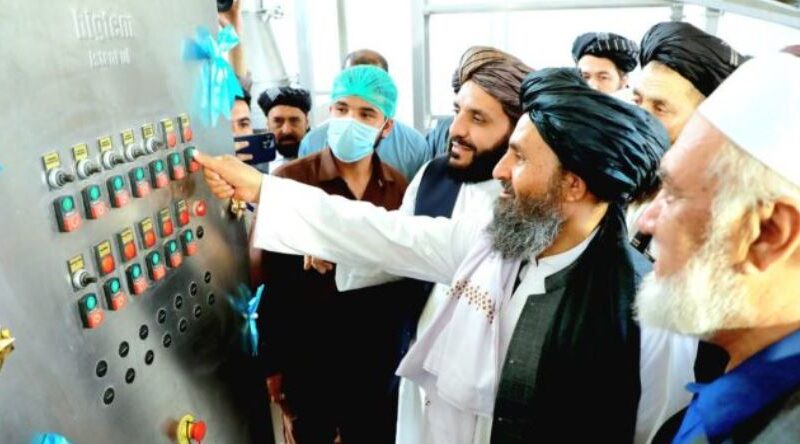Afghanistan inaugurates 8m USD raisin processing plant
UK to resettle Afghan soldiers who aided British forces
NSIA annual report: progress in IDs and vital records
Monitoring Desk
KABUL: Afghan authorities have officially inaugurated a raisin processing facility valued at 8 million U.S. dollars in Estalif district, north of the capital, Kabul, the office of the acting deputy prime minister for economic affairs announced on Wednesday.
Speaking at the inauguration ceremony, Deputy Prime Minister of Economic Affairs Mullah Abdul Ghani Baradar described the launch as a vital step toward enhancing the value of Afghanistan’s agricultural products.
“It would help boost the local economy, standardize exports, and create employment opportunities for hundreds of citizens,” said Baradar.
The plant, built on 128 acres of land, has an annual processing capacity of 10,000 metric tons of raisins. It is equipped with modern machinery to clean, dry, process, and package raisins to meet international standards, the office added.
The packaged raisins are expected to be exported to Russia, Saudi Arabia, the United Arab Emirates, Britain, and several countries across East Asia.
UK to resettle Afghan soldiers who aided British forces
The UK will resettle former Afghan soldiers and their families in Blackburn, honoring their service alongside British troops and helping them integrate as permanent, contributing residents.
Former Afghan soldiers who fought alongside British troops during the war in Afghanistan will soon resettle in Blackburn with Darwen, now holding legal residency in the UK.
The Telegraph reported Tuesday, July 29, that these veterans and their families fled Afghanistan after the Taliban seized power and destabilized the country in 2021.
The UK Ministry of Defence has chosen the Tickled Trout Hotel near Blackburn as a central site for the Afghan relocation and support program.
Phil Riley, head of Blackburn with Darwen Council, said these men “risked their lives defending British forces” and have rightfully gained the right to stay.
He stressed, “Once residency is granted, it is our duty to help them integrate quickly, ensuring they become skilled and productive members of society.”
This plan is part of a wider UK initiative to assist Afghan refugees and ex-soldiers who supported Western military operations during the 20-year conflict.
Officials emphasize the program honors past sacrifices while demonstrating Britain’s commitment to protecting and supporting those who once stood by its armed forces.
NSIA annual report: progress in IDs and vital records
These days, children can be seen in the streets of Kabul who, instead of playing and learning, bear the burden of providing for their families.
Some sell goods on the streets, while others, due to lack of better options, have turned to begging, a situation that has made it difficult to distinguish between child laborers and child beggars.
One of these children told TOLOnews: “I go to school and then I work. I take the money home. We have nothing.” Child beggars have repeatedly been collected by the beggar collection committee.
Sahel, a ten-year-old boy, was recently taken from the Kabul airport area to a collection center by the committee. He said: “Today my mother told me to go work and bring bread. I got the bread but got caught.”
Ebrahim, another beggar, said: “I regret why I did this. I will not beg anymore and will work. I am young. Allah provides sustenance.”
At the beggar collection center, some familiar faces are seen individuals who have been taken in multiple times but returned to the streets due to poverty and lack of support.
Zabihullah, a 58-year-old man brought to the center, said: “What can I do? They don’t hire me because I’m an elder. I used to work in the past, but now I can’t and had to resort to begging. I do this out of necessity.”
Official statistics from the Beggar Collection Committee show that over the past four years, around 77,845 people have been collected in Kabul, of which 42,177 were men and 26,700 women.
According to the data, 33,718 individuals were identified as potentially deserving, while 35,159 were deemed undeserving.
Mohammad Arif Faiq, the acting head of the Beggar Collection Committee, said: “The first time individuals are brought in, they are biometrically registered and then released. If they are caught again, they stay here for seven to ten days. If they are caught a third or fourth time, they are referred to the court.”
This comes after the re-establishment of the Islamic Emirate of Afghanistan, when the leader of the Islamic Emirate issued a special decree to collect beggars to reduce the number of beggars, support genuine and deserving individuals, and prevent organized and professional begging activities.



